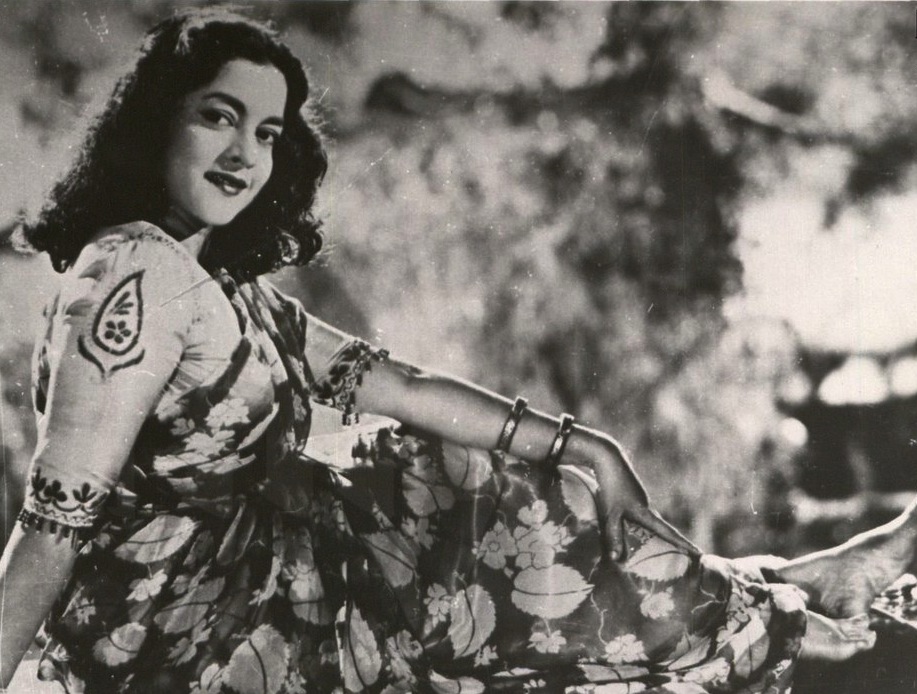Malati (Nirupa Roy), abandoned by her husband Ram, switches her infant with the one Ram has sired from his second wife so that her son would be the legal heir. Her son grows to be Ratan (Pran) who is engaged to Roopa (Nalini Jaywant) and is also the notorious dacoit, Kala Ghoda. The other boy, Amar (Dev Anand), works in disguise as a ‘munim’ in Roopa’s father’s factory, often foiling Ratan’s schemes but who just cannot understand why his mother loves Ratan more. Amar reveals his true looks only to Roopa who of course falls for him…
By the mid 1950s, Filmistan had become a regular film factory churning out a good amount of films every year. Their films clearly indicated Filmistan’s growing consciousness of genre production and their awareness of the ‘Hollywood mode.’ Filmistan also known as ‘the film factory’ because of the large number of films it kept churning out, worked within the free lance system and based their productions on star values and good music. Filmistan’s policies really paved the way for present day commercial film making in India as we know it today and was a major influence on the cinema of Manmohan Desai.
Munimji, an extremely popular Filmistan release marks the directorial debut of Subodh Mukerji, the younger brother of Filmistan boss Shashadhar Mukerji, and where he began as assistant to Gyan Mukherjee with Filmistan’s first offering Chal Chal Re Naujavaan (1944). After years of struggling with an idea, that didn’t take off, Mukherjee opted to make his debut with Munimji, based on a story idea by swashbuckling actor Ranjan of Chandralekha (1948) fame. The film is light uncomplicated, frothy fare, totally devoid of logic and is essentially a conflict between half brothers, dividing the moral conflicts between them. But what is extremely interesting is the way both the men live double lives. While Amar hides his actual looks revealing them only when he courts Roopa, Ratan, who is betrothed to Roopa, is also the bandit and blackmailer Kala Ghoda, often stopped in his track by Amar. Incidentally, both Mukerji and good friend Nasir Hussain both strongly favored the use of the masquerade as an integral part of their films, using this item repeatedly in all their films.
Munimji was among those films responsible for ushering in a trendier, freewheeling hero in Hindi Cinema, initially epitomized primarily by Dev Anand in films like Munimji, Paying Guest (1957) and Jab Pyar Kisise Hota Hai (1961) and later on by Shammi Kapoor in films like Tumsa Nahin Dekha (1957), Dil Deke Dekho (1959), Junglee (1961) and many others. But then it is important to note that Nasir Hussain wrote Munimji and thus many of the trademark touches of Nasir Hussain as boy chases girl through a colorful, playful romance layered with witty dialogues are omnipresent in the film. Munimji remains one of Dev Anand’s most popular performances while Nalini Jaywant makes for a lovely damsel-in-distress. Nirupa Roy plays one of her earliest suffering mother roles though in age, she was years younger to both Anand and Pran. She went on to win the Filmfare Award for Best Supporting Actress for her performance.
Munimji is greatly lifted by its strong musical score by SD Burman with heart-felt lyrics by Sahir Ludhianvi and Shailendra. While earlier Burman Dada had stuck to Mohammed Rafi, Talat Mahmood and Hemant Kumar for the main voice of Dev Anand with Kishore Kumar used but sparingly, in Munimji, Kishore gets easily the best song of the film Jeevan Ke Safar Mein Rahi. With this song, Kishore earned his right to be considered by Burman dada as the voice of Dev Anand. But if Kishore makes maximum impact in the film, then Hemant Kumar is not far behind with both the songs he has on Dev Anand, Shivji Behane Chale and the lighthearted ditty with Geeta Dutt and Thakur, Dil Ki Umagen Hain Jawaan! The rest of the film is dominated by the Lata Mangeshkar solos, Ek Nazar Bas Ek Nazar, Ghayal Hiraniya, Nain Khoye Khoye and the sad version of Jeevan Ke Safar Mein Rahi while Geeta Dutt leaves her vocal impress on Anari Anari Re and Zindagi Hai Zinda. Incidentally, Anari Anari Re was omitted from the film and the tune re-used by RD Burman years later in the Amitabh Bachchan starrer, Barsaat ki Ek Raat (1981) as Manchali O Manchali.
Munimji was an extremely successful film at the box office and following its success, Subodh Mukherjee finally made the film with the idea he had for years but which hadn’t taken off, Paying Guest (1957), a second successful teaming for him with Dev Anand and SD Burman.
Hindi, Comedy, Drama, Black & White



Excellent article Karan. You invoke a lot of nostalgia, particularly the song’ Shivji bhaehane chalepalkhi sajayke by the great peot Shailendra. Each and every word of that song is a lyrical delight
Thanks!
Hi Karan , Rereading your blog , I noticed an error there Karan.You have mentioned only Sahir Ludhianvi as lyricist, while there are 5 songs penned by Shailendra too- the most importantbeing= Bam bam bhola-Shivji bihane chale ,the masti song = Dil ki umange hai jawan , the Lata solo= Naina khoye khoye and 2 more
Have corrected. Thanks, once again!